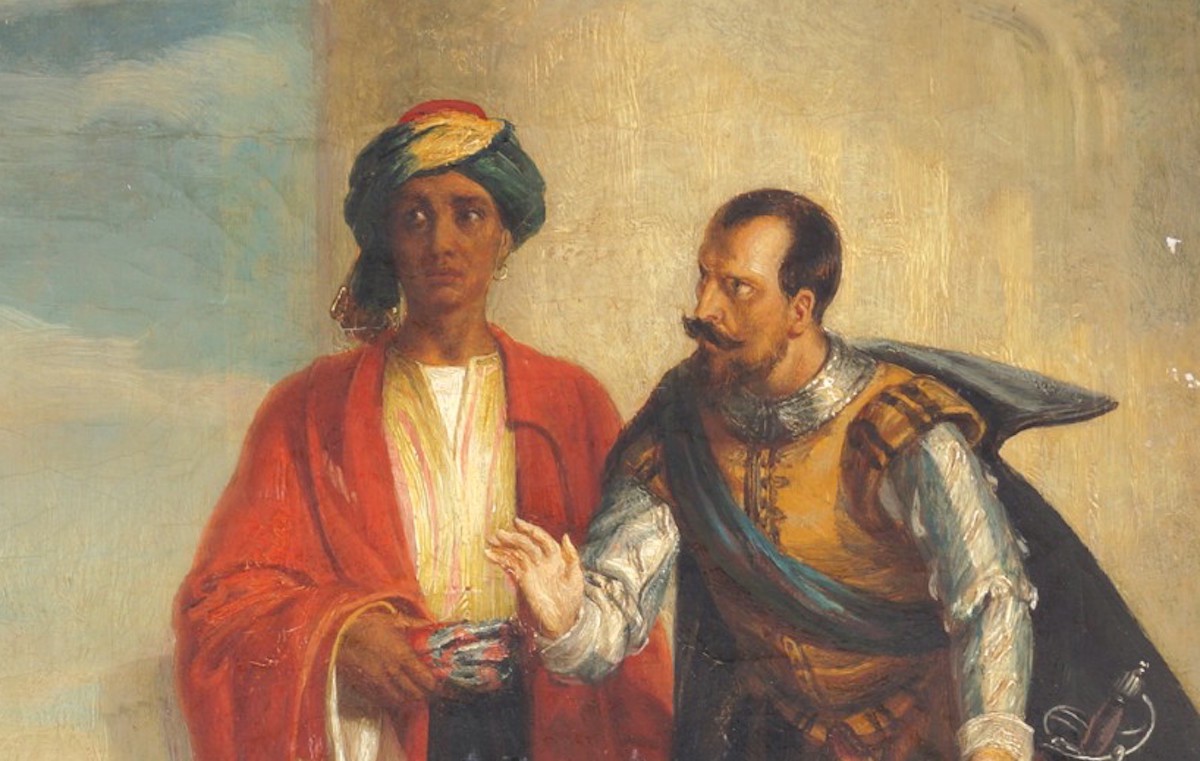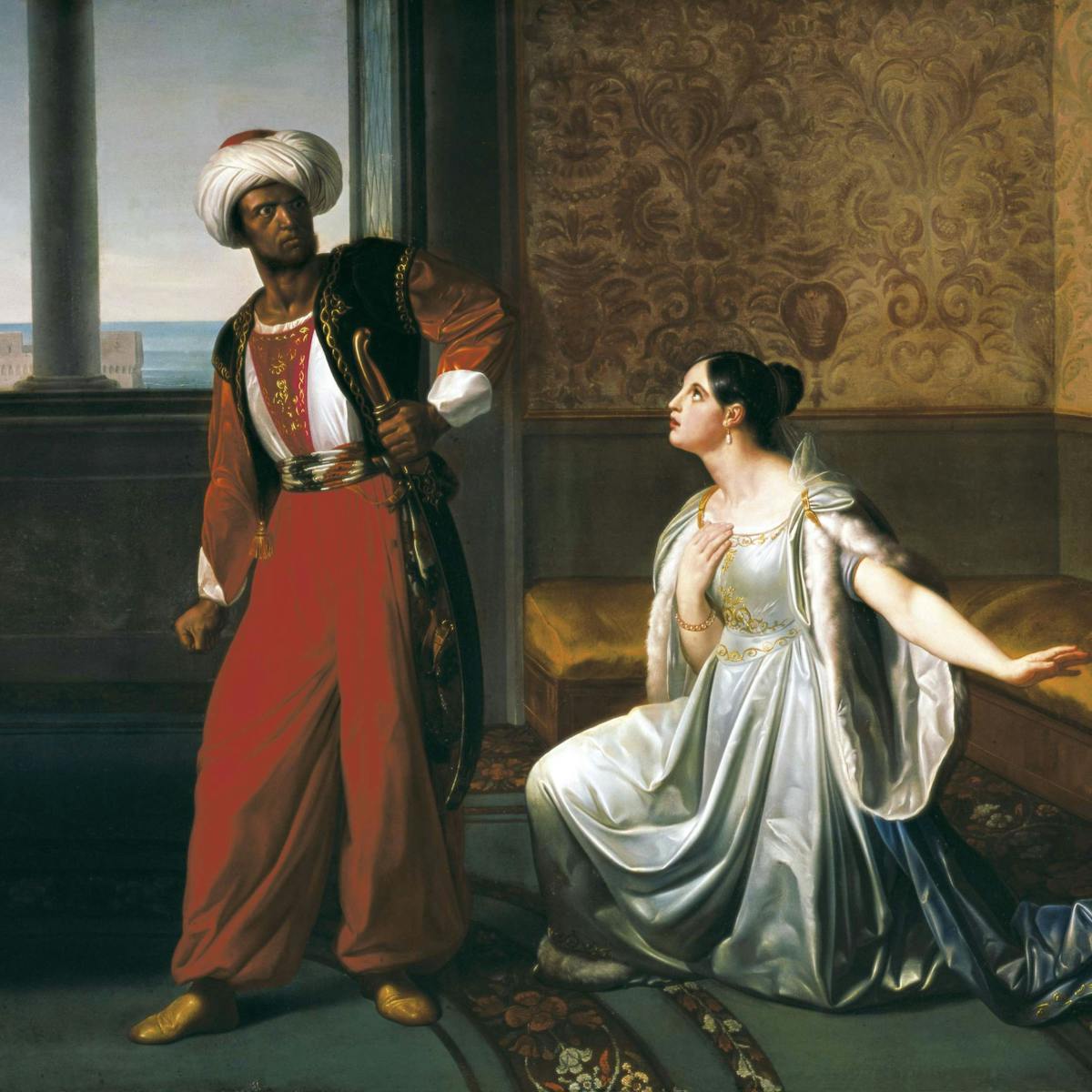(This post contains a detailed video on the topic.)
One of the most commonly cited causes for Othello’s fall is his jealousy.
But is jealousy really the problem?
In my previous post on self-conscious men in Othello and Cymbeline, I argue that there’s more to the Moor’s tragedy than jealousy. Much more. In fact, I’d go so far as to say that jealousy isn’t really the main trigger for our tragic hero’s downward spiral.
Nonetheless, jealousy seeds the deadly foliage which eventually ensnares Othello, so it’s worth deep diving into for the rest of this post.

The concept of ‘hamartia’: Is jealousy Othello’s hamartia?
Like many terms in classical literary theory, ‘hamartia’ is a semantic can of worms that continues to defy neat interpretation. Since its inception in Aristotle’s Poetics (written circa 335 BC), ‘hamartia’ has been defined as a tragic flaw, an error in judgment, or a preordained misstep.
The simplest way to understand the term is an innate character trait that one cannot get rid of – and is doomed to tragic ends because of it. But calling it a ‘flaw’ is somewhat misleading, because the word ‘flaw’ connotes moral failing, and the ‘hamartia’ of tragic heroes isn’t always a bad trait.

For example, most of us would agree that Macbeth’s ‘hamartia’ is his ambition, but ambition coupled with moderation and wisdom can be a very good thing.
In a similar vein, Hamlet’s ‘hamartia’ is his absolutism, but absolutism in the face of temptations could be the sign of a principled person.
With Othello, then, is jealousy really the hamartia that transforms him from a gracious and valiant general to a fallen and matricidal wreck? Or is jealousy merely the symptom of a more troubling character trait, from which Othello cannot escape and must contend with? And is jealousy necessarily a moral flaw, or just a complex emotion?
The historical context of Othello: the Barbary Company and the Anglo-Moroccan Alliance
To understand the intersections between Othello’s jealousy and his overall character, it’s important to look at the broader diplomatic currents in late Elizabethan England. The Anglo-Spanish War from 1585-1604 saw the continual erosion of English and Spanish relations, with Elizabeth I and Philip II of Spain at loggerheads with each other over everything from politics to trade.
Keen to form alliances as a bulwark against Spanish forces, Liz I reached out to the Moroccan Sultan and established the Barbary Company in 1585, which strengthened Anglo-Moroccan diplomatic and trading ties. During this period, the presence of Moorish emissaries grew at the English court (‘Moor’ is a term which originally meant Muslim Arabs, but gradually expanded in scope to include sub-Saharan Africans).


Such relations continued into the Jacobean era (i.e. James VI and I’s reign), and with Shakespeare being so firmly attuned to the political rhythms of James I’s court, the Bard was likely inspired by these ‘foreign aliens’, at once close and distant, to construct the protagonist of Othello.
Like The Merchant of Venice, Othello is about an ethnic ‘Other’ who must find his way in a world of white Venetians; and like the ‘Jewish play’, this ‘Moorish play’ is also based on an Italian source text – Cinthio’s Un Capitano Moro (‘A Moorish Captain’), in which a Moorish general falls victim to the evil orchestrations of his Venetian ensign.
In a way, Othello is one of Shakespeare’s most chameleonic characters: he is both man and beast; protector and intruder; lover and murderer; captain and criminal; and in the words of the Duke – “more fair than black”, but both fair and black.
And the speed with which Othello ‘switches on’ one identity or the other is a barometer of the clarity and control he has over a given situation. It’s perhaps ironic for a military man, but the less Othello acts, the clearer and more in control he is (as evidenced in his refusal to partake in the nighttime brawl at the start of the play); on the other hand, each concrete action he takes pushes him further down the tragic abyss (he dismisses Cassio and opens up room for Iago to plant suspicions about Desdemona and Cassio’s relationship; he strikes Desdemona and regards her tears as signs of deceit; he orders Iago to kill Cassio and the plan is botched; he murders Desdemona and all hell breaks loose).
The identity of Othello as an alien, however, is central to our interpretation of how hamartia works in this play, because everything the Moor does and says is tied to his self-perception.
As such, his terrible actions are, to some extent, catalysed by a flawed sense of self (and subsequently, by the jealous sentiments this sense of self breeds).
Again, self-perception is the cause; jealousy is but the symptom. He is not motivated by jealousy, but jealousy eggs him on in his quest for acceptance – both from himself and from those around him.
Othello’s obsession, then, is with his place in the world and his reputation in the eyes of others, not really with gaining absolute control over his wife.
This is, after all, someone who says –
I had been happy, if the general camp,
Pioneers and all, had tasted her sweet body,
So I had nothing known.(3.3)
Would a truly jealous man be content with ‘sharing’ his wife as long as he is kept in the dark? Hardly. In fact, bar Desdemona, Emilia and Cassio, Othello is arguably the least jealous of the remaining bunch, with Iago, Roderigo, Brabantio and Bianca all exhibiting rather more ‘classic’ signs of jealous behaviour.
In this post, I propose 3 key ideas of jealousy as presented in Othello, which are as follows:
- Jealousy is often symptomatic of deeper insecurities
- Jealousy defies logic and reason
- Jealousy is destructive and self-destructive
There’ll also be a coda at the end, in which I conclude my thoughts on whether Othello is really a tragedy of jealousy.
(By the way, have you followed my Instagram page for regular posts on English lit study tips? If not, make sure you click the banner below!)
Key idea 1: Jealousy is often symptomatic of deeper insecurities

Let’s begin with Iago, the antagonist of the play.
Most people think of Othello as a play of marital and sexual envy, but the genesis lies, in fact, in professional jealousy. We know this from the very start of Act 1, when Iago expounds his hatred for the Moor to the gullible but well-endowed Roderigo (who is in love with Desdemona and is jealous of Othello for having won the lady’s affections).
While we soon find out that there are many reasons for Iago’s distaste of Othello, the first one he offers is that the Moor has passed him over for a promotion.
According to the ensign, he was on track to become lieutenant, but the position went to “One Michael Cassio” instead –
Three great ones of the city,
In personal suit to make me his lieutenant,
Off-capped to him: and, by the faith of man,I know my price, I am worth no worse a place:
(1.1)
These are the words of a man with a wounded ego, steeped in disappointment and bitterness. The mercenary diction of “my price” and “worth” suggests that Iago sees professional relationships as mere commercial exchanges, which foreshadows the unemotional, ruthless approach he’ll go on to execute his plot of poisoning Othello’s mind.
The word “place” – meaning ‘office or rank’ – reflects Iago’s sense of entitlement, as if there’s a specific position that’s exclusive to him, waiting for him to assume.

This notion of singular exclusivity and thwarted prestige will recur in Iago’s later remarks, particularly when he alludes to the rumour of Othello and his wife Emilia’s affair.
Notice, by the way, that he makes this claim of knowing his worth before he relates Cassio’s professional triumph, which tells us that the root of his discontent is this sense that he has been cheated out of what he (believes he) ‘rightfully’ deserves, more so than in any strong jealousy towards Cassio (indeed, it’s arguable if he actually does envy Cassio, whom he disdains as “a great arithmetician” with no more than “bookish theoric” and “mere prattle, without practice [in] all his soldiership”.)
Yet, we soon realise that Iago isn’t just sore about Othello’s ‘spurn’; he also suspects that there’s something fishy going on between his captain and his wife, Emilia.
Towards the end of Act 1, Iago reiterates that –
I hate the Moor:
Why?
And it is thought abroad, that ‘twixt my sheets
He has done my office:(1.3)
“Done my office” means ‘taken my position’, but it’s interesting that Shakespeare uses professional diction to describe a domestic identity.
Perhaps the implication here is that Iago sees his marriage in similar terms as he does his occupation: both are competitions in which he can’t bear to see himself lose – especially not to a racial outsider, whom he alludes to as “black Othello” in 2.3, and doesn’t even regard as human, as he tells Brabantio in 1.1, “your daughter and the Moor are now making the beast with two backs”.

The sheer thought of Emilia having cheated on him with a ‘black beast’, then, is enough to drive Iago up the wall – no corroboration is necessary –
I know not if’t be true;
But I, for mere suspicion in that kind,
Will do as if for surety.(1.3)
At the end of Act 2 Scene 1, Iago reiterates this suspicion in a soliloquy –
For that I do suspect the lusty Moor
Hath leap’d into my seat; the thought whereof
Doth, like a poisonous mineral, gnaw my inwards;
And nothing can or shall content my soul
Till I am even’d with him, wife for wife,
Or failing so, yet that I put the Moor
At least into a jealousy so strong
That judgment cannot cure.(2.1)
Recalling such earlier references to one’s position (“place”, 1.1; “office”, 1.3), we see the notion of a unique station – “my seat” – in this quote. Professionally, Othello may be ranked higher than Iago, but domestically, Iago must maintain his patriarchal dominance, even if it is wield over just one subject: his wife.
To have even this taken away from him is unthinkable, and the last blow that his ego – “my inwards” – will stand for without hostile retaliation. Losing a lieutenancy is bad enough, but to be emasculated is unacceptable. Despite this being no more than a suspicion, Iago evokes in a simile that just “the thought” of it eats away at him “like a poisonous mineral, gnaw[ing] my inwards”.
Such is the fragility of his manhood and ego, which is really what troubles Iago, but instead of confronting his crippling insecurities, he externalises his rage and shame onto the ‘Other’ – “the lusty Moor”. The verb “leaped” in “leaped into my seat” tells us that Iago views Othello as a predatory animal rather than a fellow human being (a more human-appropriate verb would be ‘assumed’, ‘taken’ or ‘usurped’ my seat), and his bubbling plot against the Moor as a savage, bestial undertaking.

Iago’s deep-rooted insecurities, however, are secondary to those of the titular character, whose fate is basically a tragedy of insecurities. Othello is painfully aware of his inadequacies, whether it be in manner, society or speech.
The first glimpse of this comes in Act 1 Scene 3, when the Moor defends himself against Brabantio’s accusations of ‘stealing’ Desdemona at the council chamber. Before Othello gets to the main point about him being neither a sorcerer nor a kidnapper, though, he caveats that –
Rude am I in my speech,
And little bless’d with the soft phrase of peace:
For since these arms of mine had seven years’ pith,
Till not some nine moons wasted, they have used
Their dearest action in the tented field,
And little of this great world can I speak,
More than pertains to feats of broil and battle,
And therefore little shall I grace my cause
In speaking for myself.(1.3)
Much has been said about the irony in this speech, which is of course the conspicuous lack of ‘rudeness’ (meaning coarse and vulgar) in Othello’s oration. Not only is the Moor not coarse with his words, he is incredibly eloquent – almost poetic. His syntax is marked by the use of hyperbaton (the inversion of normal word order), as in “Rude am I in my speech” (vs “I am rude in my speech”), “And little of this great world can I speak” (vs “I can speak little of this great world”), “And therefore little shall I grace my cause/In speaking for myself” (vs “I shall little grace my cause in speaking for myself”).
This technique shifts the first-person pronouns of “I” and “my” to the back of the line, which enables Othello to convey the impression of self-effacing humility. Of course, he then goes on ‘humble brag’ by relating the rich experiences and stories of his battles and travels, but the point here is that he acutely registers the precarious need to appear hyper-well-mannered to the Venetians.
This awareness, however, belies the self-consciousness he feels as a Moorish outsider in a white Venetian society, as if he has to compensate for his ‘alien’ status by being extra eloquent, extra agreeable, and extra tactful. That’s all good and well at this stage in the play, but Othello’s self-awareness of ‘not belonging’ reveals for us the wobbly foundations of his confident stature, which will later morph into a much deadlier instinct at the hands of Iago’s monstrous meddling.
Indeed, as we see in Act 3 Scene 3, when Iago starts “pour[ing] [his] pestilence into [Othello’s] ear”, Othello’s composure starts to crack, and out spills his deepest, most incriminating insecurities. At Iago’s suggestion that Desdemona may be up to no good with Cassio, and that Othello should “look to your wife; observe her well with Cassio”, the Moor immediately doubts himself, and exposes the niggling anxieties within himself that’ll soon cloud his judgment –
If I do prove her haggard,
Though that her jesses were my dear heartstrings,
I’d whistle her off and let her down the wind,
To pray at fortune. Haply, for I am black
And have not those soft parts of conversation
That chamberers have, or for I am declined
Into the vale of years, – yet that’s not much –
She’s gone.(3.3)
“For I am black”; and she is white. “For I am declined” and old; but she is young. These contrasts, while previously the mark of a humanistic triumph in “the celebration of [Othello and Desdemona’s] nuptial” (2.2), are now reframed as shameful comparative points by the self-conscious Moor.
The irony, of course, is that Desdemona fell for him precisely because he is a foreigner (although her love goes beyond a fascination with exoticism), and because he is much older and more mature.
Othello’s remark that that he is “declined/Into the vale of years” also forebodes the ‘decline’ which characterises his trajectory from this point onwards in the play, and is reinforced by the symbolic image of a dent and a low area of land connoted by the word “vale”.

As Othello becomes more convinced by Desdemona’s ‘falseness’, he equates the alleged dishonour of “her name” with the black complexion of his face –
By the world,
I think my wife be honest and think she is not;
I think that thou art just and think thou art not.
I’ll have some proof. Her name, that was as fresh
As Dian’s visage, is now begrimed and black
As mine own face. […](3.3)
As Othello agonises over the tug of paradoxes between thinking his wife is honest and is not; Iago is just and is not, he wavers, but he soon confirms – all without “some proof”. It’s ironic that he should use past tense in his simile of Desdemona’s “name, that was as fresh/As Dian’s visage” (Dian is an allusion to Diana, the Roman Goddess of the Moon and of chastity), because the audience knows that she remains chaste and pure, despite Othello’s misguided accusations.
But he then parallels her ‘sullied’ name with his “begrimed and black… face”; the blackness of his face is a physical, objective truth which does not carry positive or negative connotations in itself, and yet we see that Othello has internalised the stereotypical associations of blackness with evil, which he reaffirms in this false equation of moral fallenness and dark skin.
Key idea 2: Jealousy defies logic and reason

We tend to think of Othello (and to an extent, Iago) as the only agents of jealousy in the play, and that’s fair, because their jealousies are the main catalysts of the tragedy. But even a minor character like Brabantio – Desdemona’s dad and a Venetian senator – is afflicted with this ‘disease’ of what Iago terms “the green-eyed monster” (3.3).
Brabantio is purely Shakespeare’s invention, as Cinthio’s text does not include this father figure. Interestingly, we see the shadow of Shylock in Brabantio, both being fathers of daughters who have married with men they disapprove of.

But there is a crucial difference between Shylock and Brabantio: while Shylock has always despised Christians (Lorenzo, the man Shylock’s daughter Jessica elopes with, is a Christian), Brabantio was apparently friendly to Othello before he found out about the latter’s marriage to his daughter, as we find out from Othello’s testimony at the council chamber – with Brabantio in attendance.
Is it possible, then, for someone to be perfectly cordial to another on professional terms, but to be absolutely repulsed by that same person on matters of familial relations? Many readers have attributed Brabantio’s revulsion towards Othello to pure racism, but there’s more to it than that, which I think includes a good amount of paternal jealousy, a sort of ‘reverse Electra Complex’, as it were, where a possessive father can’t quite let go of his daughter.

The fact that Brabantio didn’t like Roderigo as a suitor is early evidence of this: “My daughter is not for thee” (1.1), Brabantio tells Roderigo at the start of the play, and it’s only after he realises that Othello is the ‘alternative’ that he changes tack and says to Roderigo, “O, would you had had her!” Brabantio’s immediate assumption is that Othello must have stolen his daughter, despite him a) having spent much time with Othello, and b) presumably having a solid understanding of his own child, Desdemona.
We know that Brabantio likes Othello as a person when the latter tells the Duke and senators that –
Her father loved me; oft invited me;
Still questioned me the story of my life,
From year to year, the battles, sieges, fortunes,
That I have passed.
I ran it through, even from my boyish days,
To the very moment he bade me tell it;
[…](1.3)
Notice the active verbs Othello uses in relation to Brabantio – “loved me”, “invited me”, “questioned me”, “bade me”: the emphasis is that Brabantio was, in a way, the ‘courter’ in their relationship, who took the proactive initiative of inviting Othello over to his house and asking about his exotic life stories.
Contrary to Brabantio’s accusation of Othello being the unwelcome intruder, then, we see the opposite is the case, and that if anything, Brabantio is largely responsible for Othello and Desdemona’s marriage, having facilitated the proximity between the Moor and his daughter.
Yet Brabantio, while himself charmed by the Moor’s speech, somehow cannot fathom that his daughter would be equally attracted to the man, and insists that she must have been ‘charmed’ by sorcery instead.
Upon seeing the Moor after he finds out about the marriage, Brabantio draws his sword and barks –
O thou foul thief, where hast thou stow’d my daughter?
Damn’d as thou art, thou hast enchanted her;
For I’ll refer me to all things of sense,
If she in chains of magic were not bound,
Whether a maid so tender, fair and happy,
So opposite to marriage that she shunned
The wealthy curled darlings of our nation,
Would ever have, to incur a general mock,
Run from her guardage to the sooty bosom
Of such a thing as thou, to fear, not to delight.
That thou hast practised on her with foul charms,
Abused her delicate youth with drugs or minerals
That weaken motion: I’ll have’t disputed on;
‘Tis probable and palpable to thinking.(1.2)
Besides showing his fury, Brabantio betrays the logical gaps in his thought at this moment. First, just because “she shunned/The wealthy curled darlings of our nation” (a reference to rich white Venetian suitors) doesn’t mean that she is “oppose[d] to marriage”. This is a non sequitur, and Brabantio attempts to bridge the illogicality in his claim by pointing to Othello’s supposed “foul charms… drugs or minerals” as the cause.
It’s hard to believe that the father, in calmer circumstances, would believe his daughter to be so deprived of independent thinking, especially when we’ll very soon witness in the next scene (1.3) Desdemona’s clarity of mind and soundness in judgment.
It is surely ironic, then, that Brabantio should conclude his rant with a pseudo-appeal to thought: “I’ll have’t disputed on; ‘Tis probable and palpable to thinking”, since this speech exposes the fundamental lack in reason of Brabantio’s accusation towards the Moor.
Being the consummate schemer that he is, Iago understands the reason-shaped hole that resides in jealousy, and he manipulates this to extreme ends for his evil self-interest. Having asked his wife Emilia to steal Desdemona’s handkerchief – a gift from Othello, Iago tells us that he’ll plant this incriminating prop in Cassio’s house, and devise a situation wherein Othello will see Cassio holding onto the handkerchief, therefore jumping to the conclusion that Desdemona must have given it to her secret lover.

Iago is confident that this plan will work, because he knows that –
Trifles light as air
Are to the jealous confirmations strong
As proofs of holy writ:(3.3)
The clash between the juxtaposition of “light” and “strong” is couched within the simile of “trifles light as air” to “strong as proofs of holy writ”, but to compare two things that are so dissimilar exposes the very illogicality of the comparison. To the jealous, then, even the most trivial things would seem to carry the weight of scriptural words, which is why jealousy so often drives people to make erroneous links between the fake and the real, the flimsy and the legitimate.
In a less sinister iteration of this idea, Emilia offers practical wisdom on the baseless nature of jealousy, and the futility of getting the jealous-minded to see any reason at all. Responding to Desdemona’s bewilderment over the cause of Othello’s rage, Emilia says –
EMILIA:
Pray heaven it be state-matters, as you think,
And no conception nor no jealous toy
Concerning you.DESDEMONA:
Alas the day! I never gave him cause.
EMILIA:
But jealous souls will not be answered so;
They are not ever jealous for the cause,
But jealous for they are jealous: ‘tis a monster
Begot upon itself, born on itself.(3.4)
Emilia’s metaphor of jealousy as “a monster” echoes her husband’s earlier reference to “that green-eyed monster”. Her most striking line, though, is “But jealous for they are jealous”, the tautology of which shows that there need not be any premise for the breeding of jealous thoughts or emotions.
The epistrophe in the line “begot upon itself, born on itself” reinforces the vicious circularity of jealousy: It is like a pernicious weed that grows without end, and the more it grows the more it harms its host (which also reminds us of Iago’s characterisation of “the green-eyed monster/which doth mock the meat it feeds on”, 3.3).
The self-echoing homophones of “souls” and “so” in “jealous souls will not be answered so” also suggests a sense of stasis, and in turn, the impossibility of progress in rational dialogue with someone like Othello. This bodes ill for Desdemona, because all she has left to defend herself is her speech.
In a tragic, ironic twist, while it was her skillful and subtle way with words that first gave Othello the courage to pursue her (which we know from Othello’s testimony in 1.3, when he recalls that “she thank’d/And bade me, if I had a friend that loved her,/I should but teach him how to tell my story,/And that would woo her.”), she is now unable to leverage that same tool to talk sense back into her husband.
Key idea 3: Jealousy can be destructive

By now, we see that jealousy – while not always the primary cause of events – is the gravitational source of all destruction in the play. Consider the summary below:
- Othello is jealous of Cassio → kills Desdemona → he dies from suicide
- Brabantio is jealous of Othello → he dies from grief (allegedly)
- Roderigo is jealous of Othello → he dies from Iago’s murder
- Iago is jealous of Cassio and Othello → kills Emilia → he is punished by Cassio
- Bianca is jealous of Cassio’s supposed “newer friend” → she is not taken seriously by Cassio
But:
- Cassio isn’t jealous of anyone → he gets to live and rule over Cyprus

(This only takes into account main characters, so we’re not considering ancillary characters like the Duke of Venice, Lodovico, Gratiano etc.)
For all the men (bar Cassio), jealousy is the engine that sets in motion the subsequent destructive (and self-destructive) events. Had Roderigo not been jealous of the Moor’s successful courtship of Desdemona, he wouldn’t have become a pawn for Iago’s poisonous plot:
RODERIGO
I am changed: I’ll go sell all my land.
IAGO
Thus do I ever make my fool my purse:
For I mine own gained knowledge should profane,
If I would time expend with such a snipe
But for my sport and profit.(1.3)
Had Iago not been jealous of Cassio’s promotion and Othello’s superiority, perhaps he wouldn’t have had as strong a motivation to wreak havoc. This is reflected in his numerous references to ‘hating’ Othello, including –
I do hate him as I do hell-pains (1.1)
When he reiterates to Roderigo in Act 1 Scene 3 –
Thou art sure of me: go, make money – I have told
Thee often, and I re-tell thee again and again, I
Hate the Moor: my cause is hearted; thine hath no
Less reason.(1.3)
And once again, when Iago concludes the same scene –
I hate the Moor:
And it is thought abroad, that twixt my sheets
He has done my office:(1.3)
Had Othello not been jealous of Cassio’s relative youth and charm, he wouldn’t have fallen for Iago’s prevarications. For all the cordiality and ‘love’ he once held for his lieutenant Cassio, there’s an undergird of rivalry in their relationship, which is revealed when Othello hides behind the curtains and observes Iago and Cassio’s ‘handkerchief’ exchange. Upon seeing Cassio’s laughter (over Iago’s suggestion that he should marry Bianca, but Othello being out of earshot, doesn’t hear this), the Moor murmurs –
Do you triumph, Roman? Do you triumph? (4.1)
The word “triumph” shows that the Moor sees Cassio in competitive terms, and despite his clear professional superiority to Cassio, the idea that his lieutenant should trump him in the domestic and sexual sphere proves a much greater blow to his masculinity.

Finally, had Brabantio not been jealous of Othello’s supposed ‘thievery’ of his daughter, he wouldn’t have died so soon. As Gratiano reports in the final scene –
Poor Desdemona! I am glad thy father’s dead:
Thy match was mortal to him, and pure grief
Shore his old thread in twain:(5.2)
Even for someone like Bianca, who doesn’t meet the fatal end of the other female characters in the play, her jealousy doesn’t win her any respect. We know this because her suspicions of Cassio having another lover – “a newer friend”, “a hobby-horse” – are made the butt of Cassio’s jokes, which we see when Iago ‘questions’ Cassio in the staged handkerchief moment in Act 4 Scene 1 about marrying Bianca, whereby the lieutenant dismisses the notion that he would ever marry a whore –
IAGO
She gives it out that you shall marry her:
Do you intend it?CASSIO
Ha, ha, ha!
[…]
I marry her! What? A customer? Prithee, bear some
Charity to my wit: do not think it so unwholesome.
Ha, ha, ha!(4.1)
While Desdemona and Emilia are not themselves victims of jealousy, they fall victim to the victims of jealousy. Desdemona is eventually killed by a rage-filled, jealousy-blinded husband; and Emilia is stabbed by her evil, Machiavellian husband.
Unable to counter the force of their husbands’ moral and emotional influence, the two female characters are thus portrayed to be the scapegoats of a patriarchal social structure, in which good sense and rational judgment are subsumed under the overcast of violent male egos.

Coda: Is Othello really a tragedy of jealousy?
To end a rather long (but hopefully comprehensive!) blog post, I’d like to look at Othello’s final speech in Act 5 Scene 2, right before he kills himself after realising his wrongful murder of Desdemona –
I pray you, in your letters,
When you shall these unlucky deeds relate,
Speak of me as I am; nothing extenuate,
Nor set down aught in malice: then must you speak
Of one that loved not wisely but too well;
Of one not easily jealous, but being wrought
Perplex’d in the extreme; of one whose hand,
Like the base Indian, threw a pearl away
Richer than all his tribe; of one whose subdued eyes,
Albeit unused to the melting mood,
Drop tears as fast as the Arabian trees
Their medicinal gum. […](5.2)
Is it possible, that after so much ado with “the green-eyed monster”, for Othello to actually say that he is “one not easily jealous”, and to make a serious point about not wanting to be remembered as a jealous man? What could Shakespeare be suggesting about the root ‘cause’ of this tragedy, then?
There are those who have commented on the blame-shifting nature of this poignant monologue, but there is perhaps a more reasonable interpretation.
Instead of focusing on the Moor’s remark that he was “wrought/Preplex’d in the extreme” by evil forces, we would benefit from directing our attention to his phrase “subdued eyes”. It isn’t so much the feelings of jealousy that had led Othello astray, but rather, the psychological and cognitive impacts of jealousy. He is ‘overwhelmed’ (the meaning of ‘subdued’ here) by the confusion of the signal and the noise of jealous agents around him, and as such, was compelled to fall back on native instincts and to dispense with clear judgment.

Ultimately, Othello’s tragedy is in being a foreigner forced to assimilate in foreign land. He is given the challenge of venturing beyond his realm of expertise – military service – and into that of social, marital and sexual relations, which he fails to master for lack of Venetian sensibilities.
Still, this failure is what has enabled him to live out the maximum extent of his emotions – to “love… too well”. Having done this, then, there’s probably not much left in mortal life for him to stick around, and so, instead of regarding his suicide as the natural destination of a tragic fate, we could choose to see it as a redeeming liberation from a tragic world, which in turn makes the Moor’s death a bit less, well, tragic.


